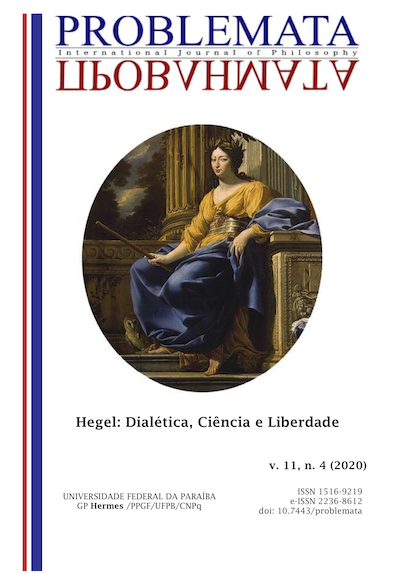HEGEL’S THEORY OF MORAL JUSTIFICATION
DOI:
https://doi.org/10.7443/problemata.v11i4.56364Keywords:
Hegel, Moral epistemology, Justification, Intuitionism, Kantian constructivismAbstract
The contribution pursues two interrelated aims: the first one is to interpret the transition from Morality to Ethical Life in the Elements of the Philosophy of Right as a theory of moral justification; the second one is to show the meaning of this theory for contemporary philosophy. The essay thus seeks to turn to Hegel’s conception in order to shed light on the limits of the current discussion in moral epistemology and then to present a possible alternative. To this end, Hegel’s text is confronted with the main theses of intuitionism, on the one hand, and Kantian constructivism, on the other, as the most prominent contemporary forms, respectively, of ethical foundationalism and coherentism.
Downloads
References
AUDI A. Self-Evidence. In: «Philosophical Perspectives». 13 (1999), pp. 205-228.
BACIN S. Moral Realism by Other Means: The Hybrid Nature of Kant’s Practical Rationalism. In: Realism and Antirealism in Kant’s Moral Philosophy: New Essays. Ed. R. dos Santos, E. E. Schmidt. Berlin-Boston: De Gruyter, 2017, pp. 155-178.
BAGNOLI C. Constructivism in Metaethics. In: The Stanford Encyclopedia of Philosophy (Winter 2017). Ed. E. N. Zalta (https://plato.stanford.edu/archives/win2017/entries/constructivism-metaethics/).
BRINK D. O. Moral Realism and the Foundations of Ethics. Cambridge: Cambridge University Press, 1989.
HALBIG C. Das Recht des subjektiven Willens (§ 132). Überlegungen zu Hegels Theorie praktischer Rationalität. In: «Hegel-Studien». 44 (2009), pp. 95-105.
HEGEL G. W. F. Linhas fundamentais da filosofia do direito, ou, Direito natural e ciência do estado em compêndio. Tradução Paulo Meneses ... [et al.]. - São Leopoldo, RS : Ed. UNISINOS, 2010.
______. Grundlinien der Philosophie des Rechts. Ed. E. Moldenhauer, K. M. Michel. Frankfurt am Main: Suhrkamp, 1986.
JONES K., TIMMONS M., ZIMMERMAN A. (eds.). The Routledge Handbook of Moral Epistemology. London-New York: Routledge, 2018.
KORSGAARD C. The Sources of Normativity. Ed. O. O’Neill. Cambridge: Cambridge University Press, 1996.
LEMOS N. Foundationalism and Coherentism in Moral Epistemology. In: The Routledge Handbook of Moral Epistemology. Ed. K. Jones, M. Timmons, A. Zimmerman. London-New York: Routledge, 2018, pp. 375-386.
MANCHISI A. L’idea del bene in Hegel. Una teoria della normatività pratica. Padova: Verifiche, 2019.
MENEGONI F. Moralità e morale in Hegel. Padova: Liviana Editrice, 1982.
MOYAR D. Hegel’s Conscience. Oxford: Oxford University Press, 2011.
______. Hegelian Conscience as Reflective Equilibrium and the Organic Justification of Sittlichkeit. In: Hegel’s Elements of the Philosophy of Right. A Critical Guide. Ed. D. James. Cambridge: Cambridge University Press, 2017, pp. 77-96.
OSTRITSCH S. Hegels Rechtsphilosophie als Metaethik. Münster: Mentis, 2014.
PRICHARD H. A. Does Moral Philosophy rest on a Mistake? In: Id. Moral Obligation. Essays and Lectures. Oxford: Clarendon Press, 1949, pp. 1-17.
QUANTE M. Die Wirklichkeit des Geistes. Studien zu Hegel. Berlin: Suhrkamp, 2011.
______. Hegels kognitivistischer Askriptivismus. In: Freiheit. Stuttgarter Hegel-Kongress 2011. Ed. G. Hindrichs, A. Honneth. Frankfurt am Main: Klostermann, 2013, pp. 589-611.
RAWLS J. Uma teoria de justiça. Ed. A. Pisetta, L. M. R. Esteves. São Paulo: Martins Fontes, 1997.
ROSS W. D. The Right and the Good. Ed. P. Stratton-Lake. Oxford: Clarendon Press, 2002.
SIDGWICK H. The Methods of Ethics. London: Macmillan, 1907.
SIEP L. Was heißt: „Aufhebung der Moralität in Sittlichkeit” in Hegels Rechtsphilosophie? In: Id. Praktische Philosophie im deutschen Idealismus. Frankfurt am Main: Suhrkamp, 1992, pp. 217-239.
STERN R. Kantian Ethics. Value, Agency, and Obligation. Oxford: Oxford University Press, 2015.
THOMPSON K. Hegel’s Theory of Normativity. The Systematic Foundations of the Philosophical Science of Right. Evanston (Ill.): Northwestern University Press, 2019.
TROPMAN E. Intutionism in Moral Epistemology. In: The Routledge Handbook of Metaethics. Ed. T. McPherson, D. Plunkett. London-New York: Routledge, 2017, pp. 472-483.
WOOD A. W. Hegel’s Ethical Thought. Cambridge: Cambridge University Press, 1990.
Downloads
Published
Issue
Section
License
Authors who publish with this journal agree to the following terms:
- Authors retain copyright and grant the journal right of first publication with the work simultaneously licensed under a Creative Commons Attribution License that allows others to share the work with an acknowledgement of the work's authorship and initial publication in this journal.
- Authors are able to enter into separate, additional contractual arrangements for the non-exclusive distribution of the journal's published version of the work (e.g., post it to an institutional repository or publish it in a book), with an acknowledgement of its initial publication in this journal.
-
- Authors are permitted and encouraged to post their work online (e.g., in institutional repositories or on their website) prior to and during the submission process, as it can lead to productive exchanges, as well as earlier and greater citation of published work (See The Effect of Open Access).





